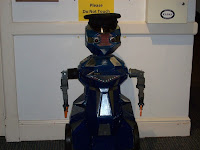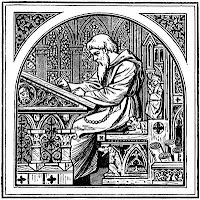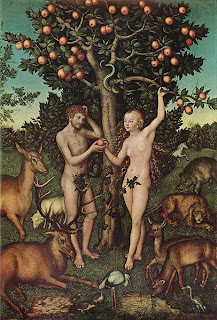My story "Heavenly Twins" you can find on
Bewildering Stories. And a strange story is connected to it; something that proves to me that all and everyone is really interconnected.
As I was teaching at the private university here in Morelia, it turned out that one of my students was born in Germany, in a town that was about half an hour from where I used to live. It also turned out that she was half-Iranian. Her father was an Iranian who lived in Austria. When she sent him an email that she had an Iranian- Canadian teacher by the name of Arash Farzaneh, her father replied that he knew one Arash Farzaneh, but that he is a writer.
I told her that I found it strange that there was another person by that name because when I was on arash.com I would have found that name there. And incidentally I was a writer too, a modest one with a dozen publications here and there. She said that her father had read a story called "Heavenly Twins." I could not believe it! Her father had stumbled upon one of my stories, and I felt the first beacons of fame. Somebody had actually read what I have written. It felt nice and encouraging!
The Heavenly Twins
The doctor was astounded; they arrived simultaneously, hand in
hand, with a silent grin on each face. The nurse was surprised not to
hear the piercing first cry of the newborns and thought at first that
they were stillborns, nothing but dead fetuses.
The doctor told the recent mother that she had twins. She just nodded, with beads of sweat dripping from her face, and fainted.
They were baptized as John and Eric, but those were not their real names; their true identities they revealed to no one.
From the onset they were regarded as unusual children, children not
pertaining to this world. It was not solely due to the fact that they
looked identical, that they had come from the same egg; they were also
exactly alike in each and every aspect.
There appeared to be an uncanny and otherworldly means of
communication between the two from the day they were born. They never
cried; they moved as if one was the mirror image of the other. Each
expression, be it of joy or pain was immediately reflected on the
other’s face, and they almost never lost sight of each other. Both ate
the same food, slept and awoke at the exact same time. People thought
they were Siamese twins, not Siamese in the sense of conjoined physical
body parts, yet as a strange spiritual connection and contortion of two
separate beings.
Their father, a taxi driver by profession and not known for his
philosophical prowess, described them one day as the equivalent of an
egg: one was the egg white, the other the yoke. However when asked who
was which, he looked dumbfounded. In fact, their own parents could not
distinguish one from the other and the father commented half jokingly,
half in earnest that they should be given the same name because there
was no use in pretending that they actually had two kids.
When they went to school, hand in hand, the same way they had
embarked onto this world, with identical lunch boxes in their backpacks,
all the other students immediately disliked them.
At first, the children would rub their eyes incredulously, as some
had never seen nor heard of twins before; a little girl ran off and hid
behind a tree. But the Two strolled along the recreation area into the
school building and looked relaxed, carefree, and irresistibly confident
in the bright summer light.
Once, their teacher accused them of cheating. It was in Grade Four
after a biology exam and he summoned both of them to see him after
class. He pretended to be angry and scolded the two kids, who stared at
him, coldly and without blinking. The teacher started sweating and
explained that such conduct would not be allowed, that their parents
would be contacted and other academic consequences would ensue; they
listened to every word, albeit in immobile fashion.
When they walked out, the teacher felt relieved, and for some odd
reason he had been afraid of his two pupils. Once again he looked at
their tests scratching his balding head. They both had attained perfect
scores, but he thought they had cheated since both tests were identical
to a speck. How could that be?
When he gave the class another test two months later, he made sure
that they were seated apart. Astonishingly, the same thing occurred. The
teacher was perplexed and felt ashamed to have made an unjust
accusation.
At night, the twins would sleep side by side, their heads comfortably
nestled on the soft cushions and dreaming. This was the only time of
the day that their inner lives differed. Although their experiences of
daily events had matched to a hair, their nightly wanderings in the
realm of sleep offered some slight variations. At times, one of them
would enter the other’s dreams and take him by the hand and lead him to
his own nocturnal universe.
Their father decided to keep one of them (it did not matter which
one) to take over the business when he was older, and the other should
continue studying. However, they both adamantly rejected the idea and
wanted to remain together. Reluctantly, their father gave up on his
future plans and yielded to his strong-willed sons.
“They drive me nuts,” he confessed to his wife, who would sit at the table silently and stare into empty space.
One fateful day, they all got into the car to drive to a nearby town
to shop for supplies. The two children sat in the back, father and
mother in the front. The mood in the car was tense; that day had been
marked once again with the heavy weight of anger and discord. Their
father hardly talked on their trip but sent fiery glances in the
direction of his wife.
The children who were in their own world did, however, take note of
the strange but recurrent behavior of their parents. Nonetheless, they
consoled themselves that these two earthly clowns could not and indeed
were not their actual progenitors, and they found great comfort and
solace in each other’s thoughts.
Suddenly, a swerving car crashed into theirs; there was a large din;
the taxi-driver lost control of the vehicle, which crashed into an
unyielding stone wall. Both husband and wife were killed instantly.
One of the boys, the one who had been baptized as Eric, was still
breathing, and he turned immediately to see how his brother fared. The
other as well was still alive, although he did not move and had his eyes
closed. Eric did not need to ask, but felt that his brother had drifted
off and was not accessible to him any more. He cried bitter tears for
the first time in his life and all of a sudden felt immeasurably alone.
His brother had fallen into a coma, the doctor explained. Eric sat
beside his bed day and night trying to communicate with him to no avail.
His brother was connected to a breathing machine, and he heard the
constant beeping of a screen monitor that showed his rather slow pulse
and heart rate.
Eric could not stay awake much longer and fell into a deep sleep.
Then his brother appeared to him. He told him that he was in great pain
and needed help.
How can I help you?
You need to do me a favor and unplug my heart.
But the doctor said you may wake up one day.
The dream version of his brother shook his head with a sad, stern, pain-ridden face. That won’t happen.
You want me to end your life then?
Yes, you see, I am trapped; this machine and my damaged body have
trapped me inside. My soul is not as free as it used to be. We cannot
remain in contact like this. I need my freedom. I need my soul to roam.
Once I am dead to this planet of Earth, I may soar the skies again, the
way it used to be. Do you remember?
No, I don’t.
You see, I am closer to death. I can see more things now,
everything is so much clearer now. Let me go and we shall join hands
again and go to all these beautiful places beyond imagination. I want to
show you.
Eric woke up with a start. There lay his brother as before, breathing
slowly but on a regular rate, his heart beating at the speed of a slow
metronome. On his brother’s face there was the look of pain and
suffering.
With a swift move, Eric unplugged the machine. Everything came to a
halt; the breathing grew more and more infrequent, turned into a gasp
and stopped completely.
Then his brother suddenly opened his eyes, smiled. His entire body
was immersed in translucent light. He stretched out his hand, which Eric
took with gladness. And then both, as one, left the blindingly white
room the same way they had entered it: hand in hand.






